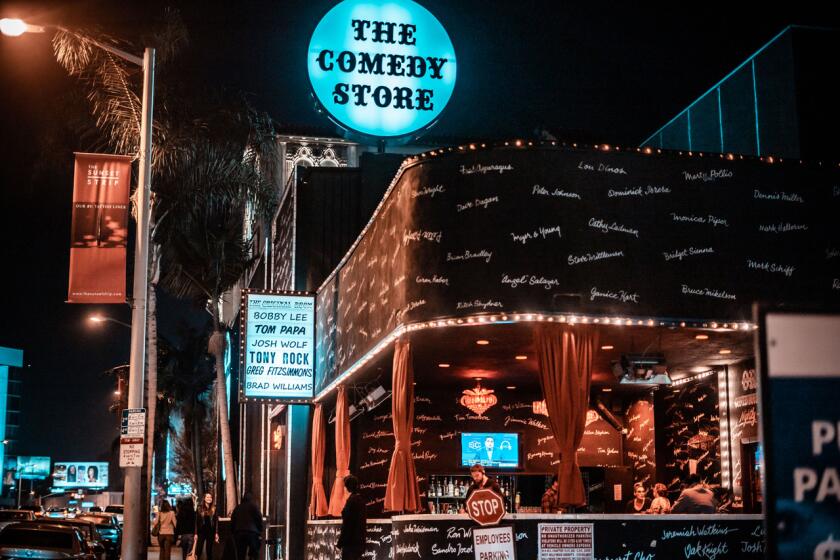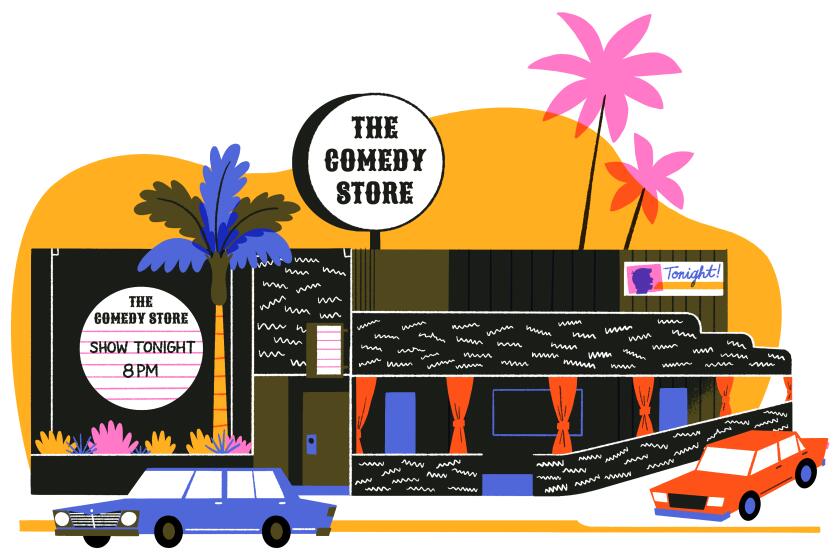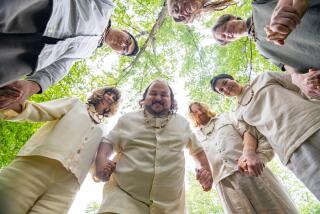The story behind the true-life train robbery that got Bert Kreischer his first film close-up in ‘The Machine’
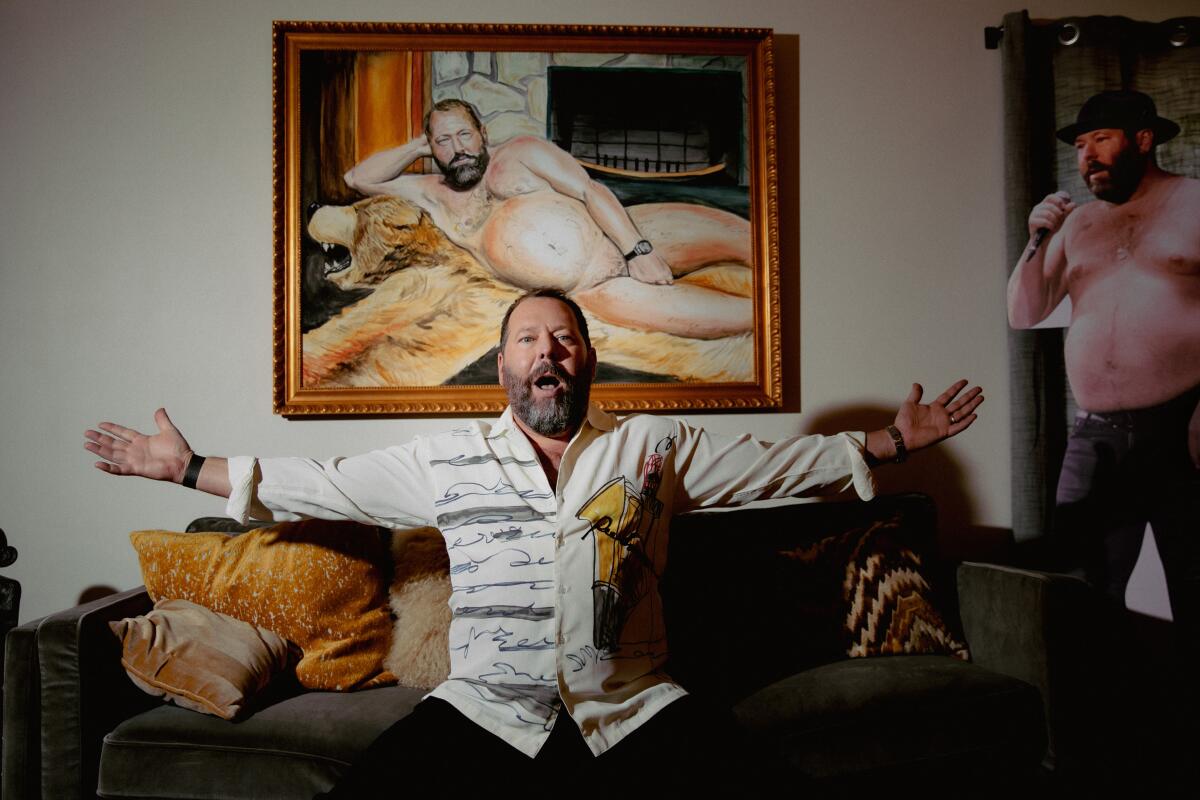
Machines — just like good comedians — aren’t born, they’re built. Bert Kreischer happens to be both, but it took some time.
Long after his days as a legendary hard-partying super senior at Florida State University, Kreischer’s experience finding his voice in stand-up didn’t really start until he learned to become a great storyteller, unveiling the truth like he strips himself of his shirt on stage — in a hysterical, honest way — with a few embellishments, of course. It’s fitting that the bit that finally helped him click things into place was a story he started telling from his college frat boy days about robbing his classmates on a train in Russia during a class trip — with help from the Russian mafia.
Kreischer fans came to know the comic as “The Machine” after the premiere of his 2016 Showtime special of the same name. And the viral clips of him retelling the tale became his calling card, but that’s not even half the story when it comes to explaining how the classic bit snowballed into Kreischer’s first feature film, “The Machine,” opening Friday.
The comedy-action flick is his debut in the film world done the only way Kreischer knows how — big. Using his real-life misadventures as a springboard to tell an amped-up version of the story, the comedian’s past comes back to haunt him 23 years later as he and his estranged father (played by “Star Wars” legend Mark Hamill) are kidnapped back to Russia by the mafia as payback for something they say he did. Together, Kresicher and Hamill are forced to retrace the steps of the comedian’s younger self (played by Jimmy Tatro) while doing battle with the mob and improving their bond as father and son.
On a recent afternoon, hanging out on the couch of the studio compound/business offices in Sherman Oaks where he records his main podcasts, including “Bertcast” and wife LeeAnn’s podcast, “Wife of the Party,” Kreischer recounts the story behind building “The Machine” into a bit that turned him into an arena-headlining comedian and now the star of his own movie.
When did storytelling and drawing from real life experiences develop in your stand-up?
I was so obsessed with comics who had their own voice and their own story. And they say something you could tell that it wasn’t a scripted thing, or something from the collective unconscious of stand-up. It was something so authentic. I remember being jealous of it and then realizing I have those stories too, I just have to be brave enough to say them. That’s really tough, to follow your own voice and your own instinct. That’s the struggle, really.
Your new movie is a clear example of authentic storytelling based on your viral bit “The Machine,” loosely based a true story about robbing a train in Russia as a college student with the Russian mob. At what point after actually living that did you feel like “OK, this is gonna be something one day?”
Never — not once. But this is the caveat: I have changed a lot with who I am as a person, meaning that when I was in college and Rolling Stone wrote the article about me when I spent 6½ years in college [the story went on to inspire the movie “Van Wilder”], I was not someone who told my own stories. People told stories about me. I was the life of the party. The life of the party is never the one telling you he’s like the party. He’s just the life of the party. And then someone’s like, ‘Dude, did you hear what Bert did at the party last night?’ And then I’d be in the room going, ‘Oh, yeah, that was crazy.’ And I can tell you the story, embellish it a little bit and make it even funnier. But I was the guy that people told the story about, and I wasn’t the one telling the story about me. When I got into stand-up, it didn’t feel natural to tell your own story about you. So for the first probably 10 years of my career, I just want to learn how to tell a joke with a setup and a punchline joke. I thought that was the craft.
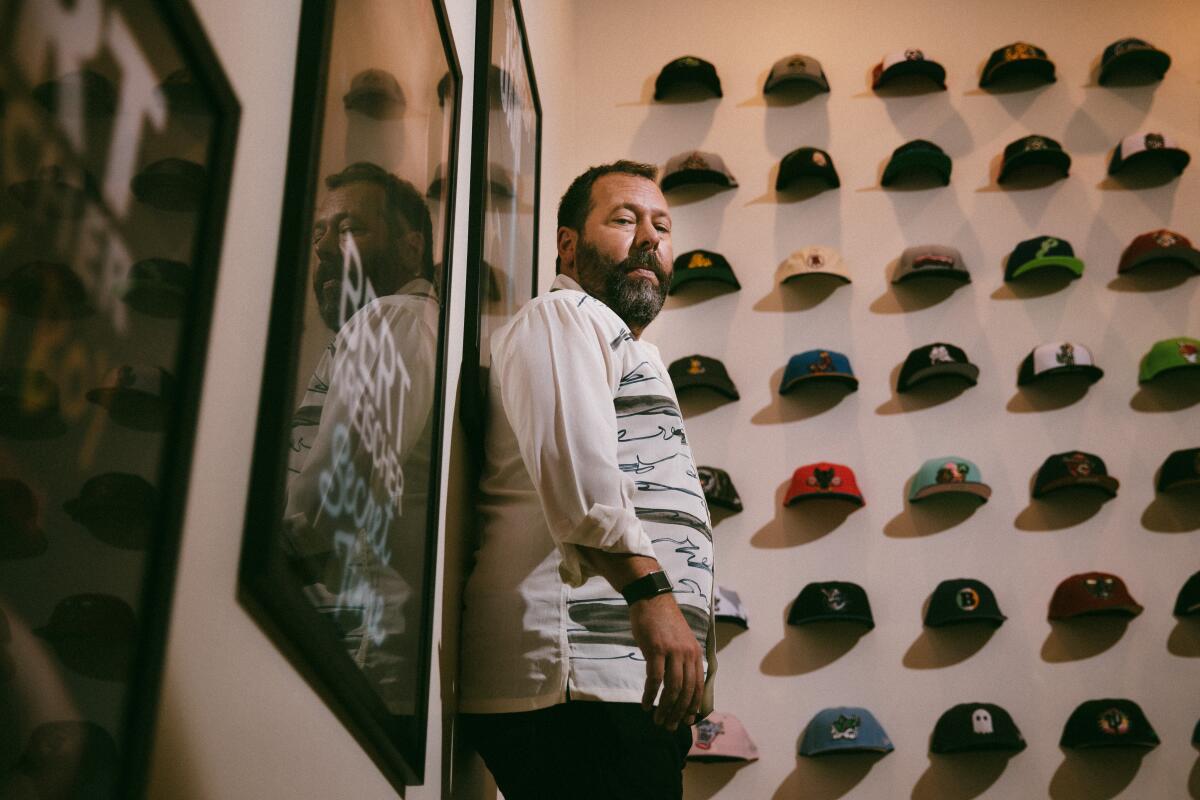
When was the first time you told “The Machine” story?
The first time I told “The Machine” it was on Dr. Drew’s “Loveline.” Someone — an old college classmate of mine — called up and said, “Hey, why don’t you tell the story about the time you robbed your friends on a train in Russia?” And I was like, “Oh, yeah!” and that was, like, the most organic version of that story ever because it was like I was in college again. I told it and Drew was blown away. He literally said, “That’s your story. That’s your movie.” That has to have been at least 16 years ago. I think [LeeAnn and I] just had [our daughter Ila]. And then he had me come back the next night and I told it again. … I think I made it a little better. This time I trimmed it up and tightened it. Then I told it on a couple morning radio shows and it was getting better every time. And I was like, oh, it’s a good radio story.
And then when I did [“The Joe Rogan Experience” podcast], that was the game changer. I went on the show the first time and I was like, “Next time I come back, remind me to tell you the story about a time I got involved with the Russian mafia and robbed a train” and Rogan was like, “What?!” I came back the next week and he was like, “You gotta tell that story.” So I told it and he also said, “This is your story. This is your movie.”
That weekend, I went to Columbus, Ohio, and Rogan had said on the podcast, “If anyone comes to his show in Columbus, Ohio ... you have to yell ‘The Machine’ at Bert and make him tell the story.” And he goes, “From this point forward he will only be referred to as the Machine.” I went that Thursday night, these guys in the front row were all chanting for me to do “The Machine” story and I was like, “Guys, it’s not a stage story.” And they were like, “Bert, it’s your story. We know it’s not going to be good, but you’ve got to tell it for it to be good. We’re gonna fake laugh, right guys? We’ll fake laugh!” And they fake laughed through the whole story. It was 20 minutes, [the bit] was horrible. And then they sat in the bar and they’re like, “Tell it tomorrow, we’ll be back tomorrow!” These guys, they were called Death Squad Ohio; they were like part of our fan base out there. They showed up every night and laughed throughout the whole story. Then I got obsessed with telling it and it just got better and better.
That process of making long bits like that tighter and tighter in your comedy act is also a great practice for scriptwriting.
It is the greatest craft I ever learned. I didn’t know I was learning it. But it was the greatest craft because it changed how I did everything. It changed my stand-up. That one story changed my DNA as a stand-up, like I’m not even remotely recognizable to who I was 10 years ago. ... With that one story I learned the most valuable lesson about storytelling: Once the story has an end, you’re good. At first I didn’t have an end to “The Machine” story. I thought if I made the story funny in the middle, that’s all I needed to do, and I couldn’t figure out why it wasn’t working. I thought the end was the tag line, “Tonight you party with us!”
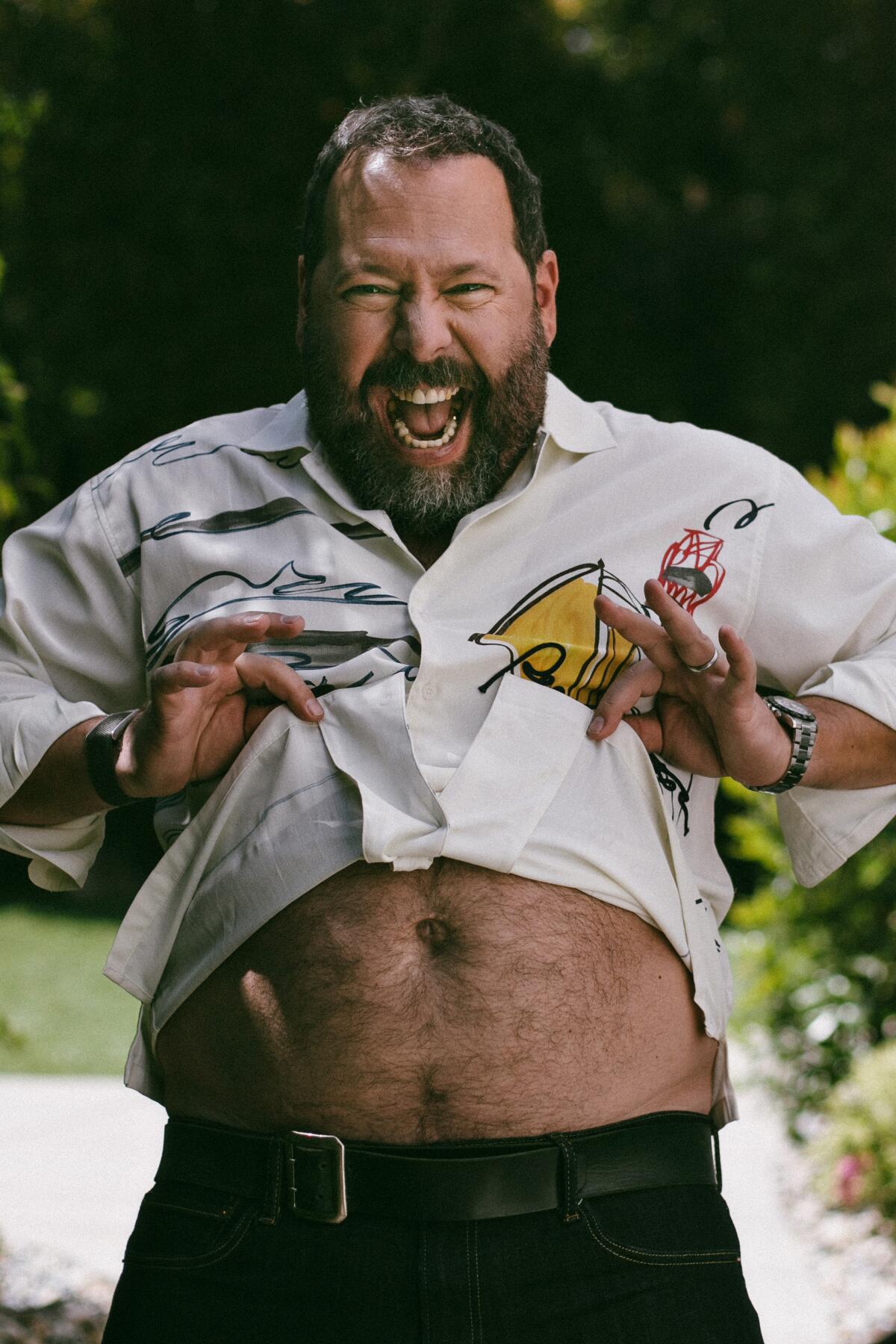
How did you figure out the ending?
One night in Columbus, Ohio, I came up with this middle chunk when [the Russian mobster] spits vodka in a Russian policeman’s face. I was trying to punch it up and make it funny and edgy. … One of the things people said a lot in Russia was they would remind you, “This is Russia. You’re in Russia.” They would say that all the time. “This isn’t America, you’re in Russia.” I came up with the tag line after I ask the officer if I’ll get in trouble with my teacher, he says to me, “F— that bitch, this is Russia!” This lightbulb went off, like finally I had [an end to the story].
How long did it take from the time you perfected the story to the time the wheels started turning on making it into a movie?
I worked on this story for five years before I filmed it [for his Showtime comedy special “The Machine” in 2016]. It took, like, four years before it was good. The story went viral in 2017. I started doing movie pitches for it 2018-19. I pitched “The Machine” movie idea so much that I got tired of pitching it.
Then in 2019 I went in to Legendary [studios] and I pitched three things that weren’t “The Machine.” Cale Boyter, who was a producer on the movie, he’s the most authentic Hollywood character you’ll ever meet — he’s against the grain and plays by his own rules; I’m shocked he’s still in Hollywood — he just goes, “OK, all right, I’ll make it.” I was like, “Which one?” He said, “I don’t care, I just want to make a movie with you, I think it would be fun. Which one do you want to make?” I said if you’re telling me I can make whatever movie I want it’s not gonna be the three I just pitched you.” So he said, “What are you gonna make?” I said, “The Machine.” He goes, “I was wondering why you didn’t pitch me that.” I told him it was because I was so bored of pitching it. I said, “Best-case scenario, it’s a hit movie and I get kidnapped by the Russian mafia.” [Boyter] looks at me and goes, “Sold! That’s our movie. It’ll be like ‘Godfather’ meets ‘The Hangover.’”
Fast-forward a few years and you’re starring in a movie next to Mark Hamill, who plays your dad. You guys had a lot of personal and funny moments throughout the movie — how much of that comes from a place of real-life chemistry?
Our first week of working together was on Zoom still, during the pandemic, when we started talking about the movie. The first thing he said was, “Why do you perform with your shirt off? Couldn’t you wear a nice collared shirt or a blazer?” My dad says that to this day: “Do you have to do comedy without a shirt? It’s just so aggressive.” And Mark was my dad through that whole movie, even off-camera. I remember one time asking Mark for parenting advice and he gave me advice and then that night I was on the phone with my dad and he gave me the exact same advice Mark gave me. Him and my dad have so many similarities that I now pick up on.
“The Machine” is also a big-time action movie. What was the preparation like incorporating so much grueling stunt work into your day?
This is gonna sound horrible, but I don’t read the action in scripts, I just read the dialogue. So I didn’t really know how much of an action movie it was until I got there. And they’re like, “You’ve got stunt training for the first three weeks,” and I go, “For what?” They said, “For the fight scenes” and I’m like, “There’s fight scenes?” And then I’m like, oh, like everything is starting to make sense. … I thought I would be a lot better on the first day than I was. I thought I’d be really good at throwing a punch — I’m not good at throwing a punch. I don’t even still know if I look natural. I know for a fact it wasn’t natural because they had to edit out me going “goosh!” — like making the fake sound of punching noises while we were filming.
I was better at putting my body at harm than I thought it would be. Any time they were like, “We’re gonna need you to do, like, a flying double kick, or we can have a stuntman do it.” I was like, “No, I think I can do it.” I was really good at that. I think it was because I grew up in Florida and we all practiced professional wrestling growing up. I did way more of the putting my body in harm stuff than I thought I would do. And then the stuff I thought I’d excel at, like the fight scenes, that took a lot of work in just memorizing it right because it’s a fight sequence. Just memorizing the choreography. Its hard because if you don’t do it correctly you can punch people’s faces, which I did a lot. In all the fight scenes I punched someone at least once.
So in the process of filming a movie called “The Machine,” you became the Machine again by going through that ordeal.
I paid the piper when I got home. I went to get an MRI and they’re like, “You ruptured all the tendons; you need surgery.” So I did the surgery and then I sold out a show at Red Rocks [in Colorado]. What are you gonna do?
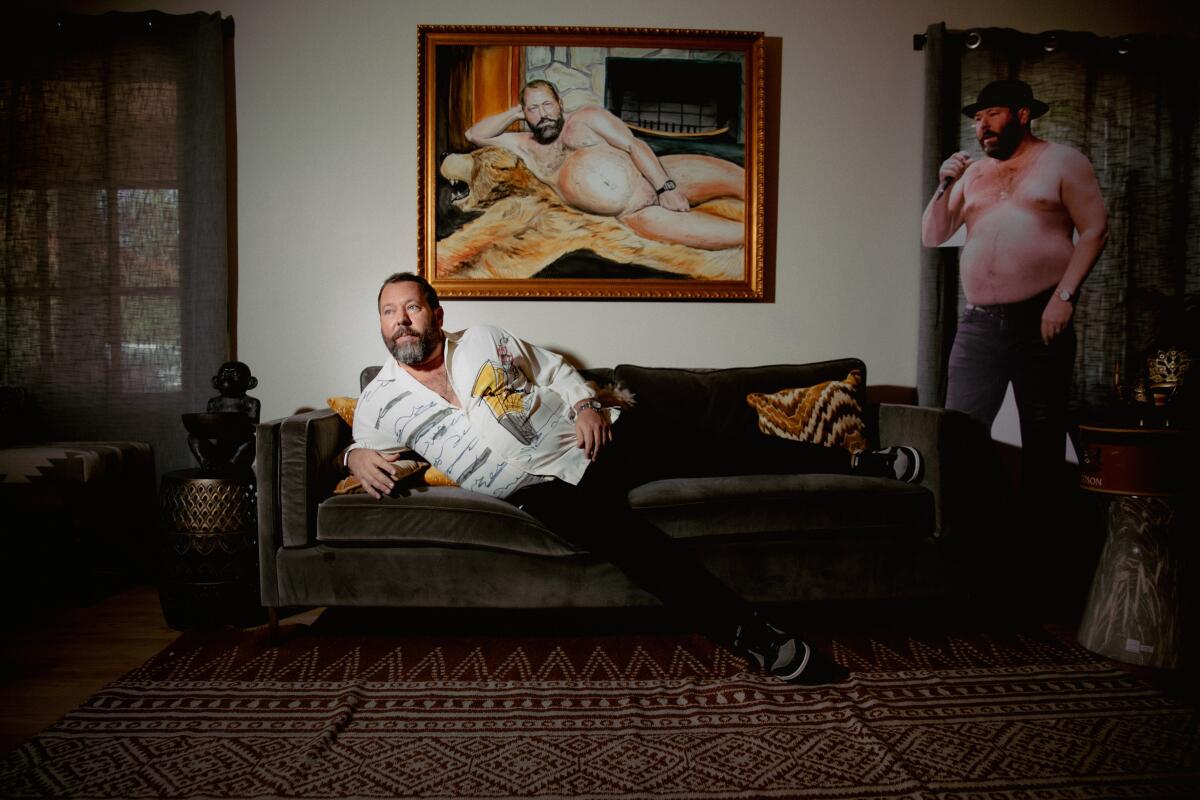
You’re now in a long line of comedians who’ve gotten the shot to make their first film. How does that feel to be in the company of so many legends in comedy who’ve had that chance?
It feels really vulnerable. I’ve never felt this way before. You’re really putting yourself out there. When I was a kid in high school or college, I remember not understanding why a guy like Johnny Depp wouldn’t wanna do press for a movie he was in — like you just did a badass movie, tell us about the badass movie you were in, I’m gonna go see it. And then when you’re in that situation, you totally get it. You totally get what it feels like to think, “I’m embarrassed that I’m going to be this, being a P.T. Barnum, self-promoting guy.” But here’s the thing that [the director] Peter Atencio said to me: “You’re not just promoting it for you, you’re promoting it for everyone that worked on the movie.” That’s what’s giving me the motivation to do it.
Now that you’ve done your first movie, is it an experience you’d ever go through again?
I told Legendary all I want to do are “The Machine” movies. Buy “The Machine” Part 2 and 3 ... buy all the sequels now, I’ll sign them for a very low price point. I don’t need a ton of money. Yeah, I’ll just do them for the rest of my life. It’ll be my “Rambo.” The next one, we can do it with the Mexican mafia. Then I gotta call the Russian mafia and they gotta come down to Mexico. And then for the next one we get the yakuza. I could do this movie for the rest of my life, easily.
‘The Machine’
Rating: R, for strong violence, pervasive language, drug use and some sexual references
Running time: 1 hour, 52 minutes
Playing: Opens Friday in general release
More to Read
Only good movies
Get the Indie Focus newsletter, Mark Olsen's weekly guide to the world of cinema.
You may occasionally receive promotional content from the Los Angeles Times.
